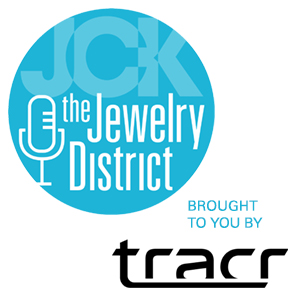
On this week’s episode, JCK editor-in-chief Victoria Gomelsky and news director Rob Bates question whether the Paris Olympics suffered from overbranding and ponder what it means for future Games, then discuss recent missteps by Tiffany & Co. and a flurry of C-suite changes at luxury watch brands. Next, Victoria explains how and why jewelry brands are tapping into the travel boom with shops in airports and aboard cruise ships. Finally, Rob brings listeners up to speed on Hodinkee’s return to its roots as a watch blog and the factors that prompted it.
Listen Now
Sponsored by Tracr: tracr.com
Episode Credits
Hosts: Rob Bates and Victoria Gomelsky
Producer and engineer: Natalie Chomet
Editor: Riley McCaskill
Plugs: @jckmagazine; tracr.com
Show Notes
03:15 The Olympics…brought to you by LVMH?
07:25 Trouble at Tiffany’s?
12:30 Watchmakers play musical chairs
15:35 A world of opportunity in travel retail
20:38 Hodinkee returns to its roots
Show Recap
The Olympics…brought to you by LVMH?
Victoria and Rob weigh in on the prominence of LVMH and Louis Vuitton during the Paris Summer Olympics. “It felt a little too corporate,” says Victoria. She wasn’t the only one put off by such blatant branding, Rob says. He quotes a recent article by New York City–based writer Amy Odell, who called the Games “one giant LVMH ad.”
This level of sponsorship is a first not just for LVMH but for any luxury brand, Rob observes. It was an unusual choice for a company that has long emphasized exclusivity over mass appeal, given that the Olympics are arguably the ultimate mass-appeal sporting event.
Despite her reservations about brand affiliations at the Olympics, “I can’t help but admire Omega,” says Victoria. While watching swimmers compete in one of the butterfly events, she was impressed by the Omega logo on the clock shown whenever they checked their times. It’s powerful product placement, but it’s also logical for the Official Timekeeper of the Olympic Games since 1932.
Victoria wonders whether LVMH’s partnership was unique for Paris 2024 or a sign of things to come. Will more brands put their stamps on the Games in the future?
Trouble at Tiffany’s?
The conversation turns to another LVMH company—Tiffany & Co., whose sleek, remodeled Landmark store on Fifth Avenue in Manhattan epitomizes LVMH’s quest to elevate that brand. There are questions whether LVMH’s traditional playbook would work for Tiffany, Rob says, noting that while Tiffany has always been high-end, it’s also been considered “accessible luxury.” Just look at the classic film Breakfast at Tiffany’s, which celebrated the notion that anyone could (window-)shop at Tiffany’s.
Change takes time, though, and attracting a new customer base without driving away existing clientele can be tricky, Rob says. Reshaping corporate culture poses yet another challenge. Both may be factors, he says, in Tiffany’s business slipping since the pandemic, which the jeweler has acknowledged. In addition, ambitious new sales targets have reportedly resulted in increased staff turnover.
Watchmakers play musical chairs
The conversation turns to luxury watches and Rob’s recent JCK story on Julian Tornare’s appointment as CEO of Hublot, just six months after he became CEO of TAG Heuer (both brands are owned by LVMH). Tornare’s move came on the heels of Richemont naming new CEOs for Cartier and Van Cleef & Arpels. Rob likens it to a game of musical chairs—and Victoria notes it’s happening against a backdrop of declining global watch sales, particularly in China.
It’s no surprise to see brands trying to mitigate their losses and recalibrate with leadership better suited to today’s challenging environment, she says. The growing Indian watch market is a bright spot, Victoria says, though it’s in no position to overtake the U.S. or China yet in terms of export value.
Rob draws a parallel between the downturn for luxury watches and the downturn for diamonds. The latter is generally attributed to the rise of lab-grown stones, but it dovetails with a slowdown for luxury retail in general, he says. “It’s a challenging time for luxury,” Rob concludes.
A world of opportunity in travel retail
In contrast to the luxury watch business, the travel retail sector is hot, Victoria reports. During the pandemic, jewelry and watch sales soared, but they have tapered off as consumers channel their attention (and their disposable income) into experiences.
To tap into the travel boom, brands are building out spaces in airports and on cruise ships. Victoria recently spoke with Caryl Capeci, senior vice president of fine jewelry and watches with Starboard Cruise Services, who told her passenger numbers are surpassing pre-pandemic levels. Onboard jewelry stores make sense because “a lot of those people are on the trip of a lifetime, and they want to commemorate it with a purchase like jewelry,” says Victoria.
Hodinkee returns to its roots
Finally, Rob and Vic discuss the news that Hodinkee is scrapping e-commerce to again be a watch blog. They trace the company’s trajectory from a website beloved by watch fanatics to a selling and resale site which drew funding from power players like LVMH and singer John Mayer.
After Hodinkee acquired secondhand watch company Crown & Caliber for a reported $46 million, the two cultures clashed, e-tail proved more challenging than expected, and layoffs and losses followed.
“I’d like to say that our focus never wavered from delivering the best content, first and foremost—but the truth is, things did change,” founder Ben Clymer wrote in his announcement about Hodinkee’s shift. “We’ve learned a lot. And now it’s time to get back to basics.”
Rob points out that Hodinkee faced a dilemma not uncommon in the business world: how do sites stay true to a vision when trying to monetize? Is it possible to preserve genuine reader engagement after evolving into an e-commerce platform?
Hodinkee fans seem pleased with the move, Victoria says, but she wonders how the company will support an editorial team once it stops selling watches.
- Subscribe to the JCK News Daily
- Subscribe to the JCK Special Report
- Follow JCK on Instagram: @jckmagazine
- Follow JCK on X: @jckmagazine
- Follow JCK on Facebook: @jckmagazine






